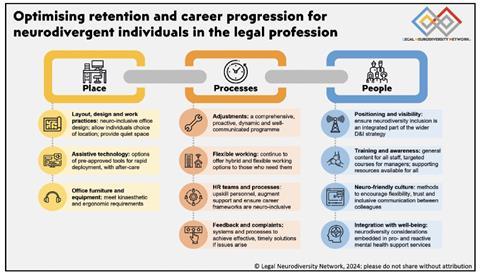Employers risk losing some of their best talent if their workplace practices do not let employees with all types of minds thrive. The Legal Neurodiversity Network (LNN) has recently made recommendations for optimising retention and career progression for neurodivergent individuals in the legal profession.


What prompted the guide?
Inspired by the likes of Cardiff University/Disabled Solicitors Network’s Legally Disabled? research and the Law Society’s reasonable adjustments guidance for disability inclusion, this guide is a collaborative document. It reflects discussions at a LNN roundtable hosted by Linklaters last June, along with subsequent talks on effecting lasting positive change for neurodivergent people working in the profession.
How legal services employers can support neurodivergent employees is an issue brought home by the experience of one LNN member: ‘I asked for adjustments at my interview, which were accommodated, but then when I started none of this was carried through into my job and the firm was not helpful in accommodating my requests for adjustments.’
What’s in the guide?
Every neurodivergent person is different. This guide makes general suggestions for effecting positive change based on what some leading legal sector employers are currently doing. Many suggestions constitute ‘easy (as well as inexpensive) wins’ that often also benefit other minority groups, or indeed all employees.
The recommendations are grouped into three key themes (the three Ps): Place, Processes and People. Each one represents a core area of neuro-inclusive good practice.
Our Place section explores the physical legal working environment and suggests how to make it more neuro-inclusive, such as by offering fixed seating options and offices with natural lighting. These types of environmental adjustment are, in most cases, easy to implement and make a huge difference to neurodivergent people who may have particular, and often acute, sensory needs.
Our Processes section spotlights workplace adjustments typically implemented through an employer’s human resources department, which makes the daily workplace experience for a neurodivergent individual more straightforward. This includes accommodations such as flexible working arrangements, clear communication regarding tasks, and appropriate training for HR managers and supervisors.
Finally, our People section addresses, arguably, the most challenging yet important aspect of neuro-inclusion: workplace culture. While great strides have been made in recent years regarding neurodiversity awareness, this does not necessarily translate into a workplace culture in which neurodivergent people feel socially accepted or understood. The guide suggests how to improve this, such as neurodiversity training sessions, developing peer-to-peer support networks, and having the executive publicly, and demonstrably, embrace neurodiversity.
As well as general recommendations, the guide also acknowledges the diversity of neurodivergent experience. It emphasises that in order for neuro-inclusive support to be at its most effective, it also has to be specific to each individual’s areas of strength and challenge. It therefore provides links to additional, specialist resources that employers can use in order to understand the particular needs of their employees.

Where can I find the guide?
As well as the guide being published here at tinyurl.com/v9s6945z, practitioners might be interested to know that the LNN is also holding a clinic-style event at Herbert Smith Freehills on 25 June to discuss implementing the guide’s recommendations. The LNN welcomes your feedback.
What is the LNN?
Established in 2022, the LNN strives to improve neurodivergent inclusion in the UK legal profession. It identifies, shares and encourages good practice, and establishes connections between employers, individuals and partner organisations.
The LNN is supported by the law societies of England and Wales, and Scotland. It has over 70 law firms and organisations’ in-house legal departments of varying sizes and national and international footprints among its membership. To join, contact committee member James Smither.
Most of the network’s committee members are from top-50 firms, though Martin Whitehorn, for example, works at a small firm that was until recently a sole practitioner’s practice. Whatever your organisation’s size, reasonable adjustments can often be quite simple.
Further discussions to come
In the coming weeks, the LNN will supplement this introduction with a series of follow-up articles discussing each of the three Ps in more detail. For now, the LNN will leave you with this quotation from a member: ‘The policies on neurodiversity inclusion can look amazing on paper; even the office can look great. But if the culture in your team that you’re around every day isn’t kind and accommodating, you will still be miserable. For me, this is the biggest variable – and the hardest to get right.’
- For more information on the Law Society’s Disabled Solicitors Network, click here
Flora Sitwell is social media and communications lead; and Martin Whitehorn is projects and campaigns co-lead at the Legal Neurodiversity Network































No comments yet